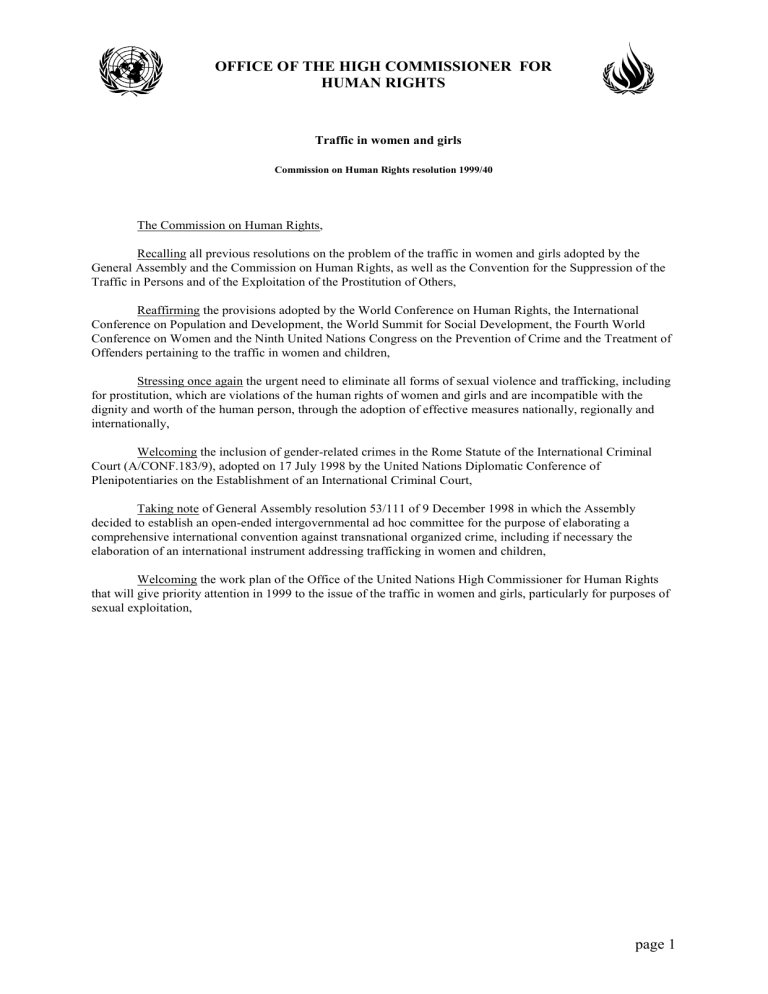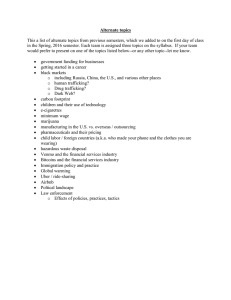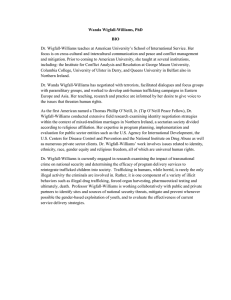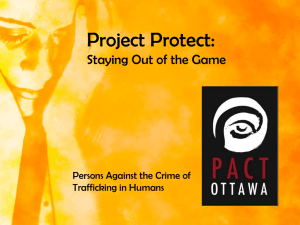OFFICE OF THE HIGH COMMISSIONER FOR HUMAN RIGHTS

OFFICE OF THE HIGH COMMISSIONER FOR
HUMAN RIGHTS
Traffic in women and girls
Commission on Human Rights resolution 1999/40
The Commission on Human Rights,
Recalling all previous resolutions on the problem of the traffic in women and girls adopted by the
General Assembly and the Commission on Human Rights, as well as the Convention for the Suppression of the
Traffic in Persons and of the Exploitation of the Prostitution of Others,
Reaffirming the provisions adopted by the World Conference on Human Rights, the International
Conference on Population and Development, the World Summit for Social Development, the Fourth World
Conference on Women and the Ninth United Nations Congress on the Prevention of Crime and the Treatment of
Offenders pertaining to the traffic in women and children,
Stressing once again the urgent need to eliminate all forms of sexual violence and trafficking, including for prostitution, which are violations of the human rights of women and girls and are incompatible with the dignity and worth of the human person, through the adoption of effective measures nationally, regionally and internationally,
Welcoming the inclusion of gender-related crimes in the Rome Statute of the International Criminal
Court (A/CONF.183/9), adopted on 17 July 1998 by the United Nations Diplomatic Conference of
Plenipotentiaries on the Establishment of an International Criminal Court,
Taking note of General Assembly resolution 53/111 of 9 December 1998 in which the Assembly decided to establish an open-ended intergovernmental ad hoc committee for the purpose of elaborating a comprehensive international convention against transnational organized crime, including if necessary the elaboration of an international instrument addressing trafficking in women and children,
Welcoming the work plan of the Office of the United Nations High Commissioner for Human Rights that will give priority attention in 1999 to the issue of the traffic in women and girls, particularly for purposes of sexual exploitation,
page 1
Acknowledging the report of the Special Rapporteur on the sale of children, child prostitution and child pornography (E/CN.4/1999/71 and Add.1), particularly the special focus on the sale and trafficking of children,
Welcoming bilateral and regional cooperation mechanisms and initiatives to address the problem of trafficking in women and girls, and taking note of the draft convention on preventing and combating trafficking in women and children for the purposes of prostitution of the South Asian Association for Regional Cooperation, as well as the establishment of the Association of Southeast Asian Nations Center for Combating Transnational
Organized Crime,
Recognizing that global efforts, including international cooperation and technical assistance programmes, to eradicate trafficking in women and girls demand strong political commitment by and the active cooperation of all Governments of countries of origin, transit and destination,
Underlining the importance of systematic data collection in determining the extent and nature of the problem of trafficking in women and girls and the need for countries to establish or upgrade data banks to be able to understand better the magnitude of trafficking and the situation of victims,
Stressing the need for a global approach to eradicate trafficking in women and children and the importance, in this regard, of systematic data collection and comprehensive studies, including on the modus operandi of trafficking syndicates,
Acknowledging the work done by intergovernmental and non-governmental organizations in compiling information on the scale and complexity of the problem of trafficking, in providing shelter for trafficked women and children, and in effecting their voluntary repatriation to their countries of origin,
Noting with concern the increasing number of women and girl children from developing countries and from some economies in transition who are being trafficked to developed countries, as well as within and between regions and States, and acknowledging that the problem of trafficking also includes the victimizing of young boys,
Gravely concerned at the increasing activities of transnational criminal organizations and others that profit from international trafficking in women and children without regard to dangerous and inhumane conditions and in flagrant violation of domestic laws and international standards,
Deeply concerned about the unabated use of new information technologies, including the Internet, for purposes of prostitution, child pornography, paedophilia, trafficking in women as brides and sex tourism,
1. Takes note with appreciation of the note by the Secretary-General (E/CN.4/1999/66) drawing the attention of the Commission to his report to the General Assembly on trafficking in women and girls
(A/53/409);
page 2
2. Welcomes national, regional and international efforts to implement the recommendations of the
World Congress against Commercial Sexual Exploitation of Children, and calls upon Governments to take further measures in that regard;
3. Calls upon Governments of countries of origin, transit and destination and appropriate regional and international organizations to implement the Platform for Action of the Fourth World Conference on Women
(A/CONF.177/20, chap. I, annex II) and the Vienna Declaration and Programme of Action of the World
Conference on Human Rights (A/CONF.157/23);
4. Urges Governments to take appropriate measures to address the root factors, including external factors, that encourage trafficking in women and girls for prostitution and other forms of commercialized sex, forced marriages and forced labour, so as to eliminate trafficking in women, including by strengthening existing legislation with a view to providing better protection of the rights of women and girls and to punishing perpetrators, through both criminal and civil measures;
5. Invites Governments to take steps to ensure for victims of trafficking the respect of all their human rights and fundamental freedoms;
6. Calls upon Governments to criminalize trafficking in women and girls in all its forms, to condemn and penalize all the offenders involved, including intermediaries, whether their offence was committed in their own or in a foreign country, while ensuring that the victims of those practices are not penalized, and to penalize persons in authority found guilty of sexually assaulting victims of trafficking in their custody;
7. Encourages Governments to conclude bilateral, subregional, regional and international agreements to address the problem of trafficking in women and girls;
8. Also encourages Governments in elaborating the draft convention against organized transnational crime, including the draft protocol to prevent, suppress and punish trafficking in women and children, to include fully a human rights perspective and to take into account work being done in other international forums, particularly the Commission on Human Rights Working Group on an optional protocol to the Convention on the Rights of the Child on the sale of children, child prostitution and child pornography;
9. Invites Governments to encourage Internet service providers to adopt or strengthen selfregulatory measures to promote the responsible use of the Internet with a view to assisting in the elimination of trafficking in women and girls;
10. Encourages Governments, in cooperation with non-governmental organizations, to undertake campaigns aimed at clarifying opportunities, limitations and rights in the event of migration so as to enable women to make informed decisions and to prevent them from becoming victims of trafficking;
11. Invites Governments, with the support of the United Nations, to formulate manuals for the training of personnel who receive and/or hold in temporary custody victims of gender-based violence, including trafficking, taking into account current research and data on traumatic stress and gender-sensitive counselling techniques, with a view to sensitizing them to the special needs of the victims;
12. Encourages relevant United Nations bodies and organizations, including the United Nations
International Research and Training Institute for the Advancement of Women, the United Nations Development
Fund for Women, the United Nations Children’s Fund, the International Labour Organization and the United
Nations Educational, Scientific and Cultural Organization, as well as the International Organization for
Migration, to contribute to the preparation of guidelines for the use of Governments in the elaboration of their training manuals and in the preparation of educational and information programmes, in cooperation with relevant intergovernmental and non-governmental organizations;
13. Encourages the Office of the United Nations High Commissioner for Human Rights to continue to include the issue of traffic in women and girls in its programme of work under its advisory, training and information activities, with a view to providing assistance to Governments, upon their request, in instituting preventive measures against trafficking through education and appropriate information campaigns;
page 3
14. Calls upon concerned Governments to allocate resources to provide comprehensive programmes designed to heal and rehabilitate into society victims of trafficking, including through job training, legal assistance and health care and by taking measures to cooperate with non-governmental organizations to provide for the social, medical and psychological care of the victims;
15. Invites relevant intergovernmental and non-governmental organizations to provide advisory services to Governments, upon their request, in planning and setting up rehabilitation programmes for victims of trafficking and in training personnel who will be directly involved in the implementation of those programmes;
16. Encourages Governments to strengthen cooperation to combat trafficking and rehabilitate victims, including through, inter alia:
(a) Technical cooperation to developing countries requesting assistance;
(b) Sharing of experience, best practices and lessons learned;
(c) Consultation mechanisms, such as the regional consultation process organized in cooperation with the International Organization for Migration;
17. Invites the Special Rapporteur on violence against women, its causes and consequences, and the Special Rapporteur on the sale of children, child prostitution and child pornography and the Working Group on Contemporary Forms of Slavery of the Sub-Commission on Prevention of Discrimination and Protection of
Minorities to continue addressing, within their respective mandates, the problem of trafficking in women and girls as a priority concern and to recommend, in their reports, measures to combat such phenomena;
18. Encourages the Inter-Agency Committee on Women and Gender Equality to continue to address the issue as part of the integrated follow-up to the Fourth World Conference on Women;
19. Requests the SecretaryGeneral to provide the Commission, at its fifty-sixth session, with a report on activities of United Nations bodies and other international organizations pertaining to the problem of trafficking in women and girls;
20. Decides to continue its consideration of this question at its fifty-sixth session under the appropriate agenda item.
55th meeting
26 April 1999
[Adopted without a vote. See chap. XII.]






